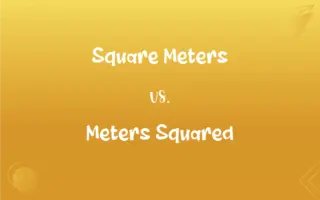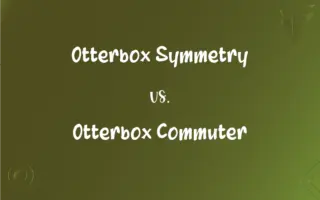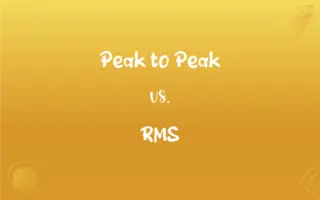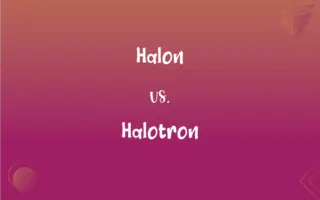Singlet State vs. Triplet State: What's the Difference?
Edited by Aimie Carlson || By Harlon Moss || Published on February 15, 2024
Singlet state has paired electron spins; triplet state has unpaired, parallel spins, differing in magnetic properties and energy levels.

Key Differences
Singlet state is a state of an electron configuration where all electrons are paired, resulting in a lower energy state. In contrast, the triplet state is characterized by having two unpaired electrons with parallel spins, leading to a higher energy level.
The singlet state is diamagnetic, meaning it is weakly repelled by a magnetic field due to its paired electron spins. The triplet state, however, is paramagnetic as the unpaired electrons respond more strongly to magnetic fields.
In quantum mechanics, the singlet state is represented by a symmetric wave function, while the triplet state has an antisymmetric wave function. This distinction affects their quantum behavior and interactions.
Chemically, the singlet state is often less reactive than the triplet state. The triplet state's unpaired electrons can participate more readily in chemical reactions, making it more reactive in certain conditions.
The singlet state typically has a shorter lifespan than the triplet state. Transitioning from the triplet to singlet state (intersystem crossing) is rarer and slower due to the need for a change in spin state.
ADVERTISEMENT
Comparison Chart
Electron Spins
Paired and opposite
Unpaired and parallel
Magnetic Properties
Diamagnetic (weakly repelled by magnetic fields)
Paramagnetic (stronger response to magnetic fields)
Energy Level
Lower due to paired electrons
Higher due to unpaired electrons
Chemical Reactivity
Generally less reactive
More reactive due to unpaired electrons
Quantum Wave Function
Symmetric
Antisymmetric
ADVERTISEMENT
Lifespan and Transitions
Shorter lifespan, rarer transitions
Longer lifespan, more common transitions
Singlet State and Triplet State Definitions
Singlet State
A lower energy state in electron configurations.
Molecular oxygen transitions from a triplet to a singlet state during chemical reactions.
Triplet State
A quantum state with two unpaired electrons having parallel spins.
In photosynthesis, the triplet state of chlorophyll plays a crucial role in energy transfer.
Singlet State
A non-magnetic state in molecular spectroscopy.
The fluorescence in organic compounds often involves transitions from a singlet excited state.
Triplet State
A paramagnetic state in molecular spectroscopy.
Triplet state carbene is highly reactive due to its unpaired electrons.
Singlet State
A state with total spin angular momentum of zero.
The ground state of helium is a singlet state, indicating no net spin.
Triplet State
A state with total spin angular momentum of one.
Certain phosphorescent materials emit light by transitioning from a triplet excited state to a lower energy state.
Singlet State
A quantum state with all electrons paired.
In benzene, the electrons are in a singlet state, contributing to its stability.
Triplet State
A higher energy state in electron configurations.
Molecular oxygen in its natural state is in a triplet state, making it a diradical.
Singlet State
A symmetric quantum state in terms of electron spin.
In singlet oxygen, the two electrons occupy a symmetric quantum state.
Triplet State
An antisymmetric quantum state in terms of electron spin.
The triplet state in organic semiconductors is essential for their optoelectronic properties.
FAQs
Are singlet states reactive?
They are generally less reactive than triplet states.
What defines a singlet state?
A state where all electron spins are paired, resulting in no net spin.
What characterizes a triplet state?
A state with two unpaired electrons having parallel spins.
Which state is more common in nature?
The triplet state is more common due to its stability.
How do singlet and triplet states differ in energy?
Singlet states are lower in energy due to paired spins, while triplet states are higher due to unpaired spins.
Can both states exist in the same molecule?
Yes, molecules can transition between these states.
What makes triplet states unique in chemical reactions?
Their unpaired electrons make them more reactive.
Do these states have different lifespans?
Yes, singlet states typically have shorter lifespans.
How do magnetic properties differ between these states?
Singlet states are diamagnetic, and triplet states are paramagnetic.
Do these states play a role in photosynthesis?
Yes, especially the triplet state in energy transfer.
How do these states affect fluorescence?
Fluorescence usually involves a transition from an excited singlet state.
How do these states relate to molecular stability?
Singlet states often contribute to stability due to paired spins.
What role do these states play in organic semiconductors?
They are crucial in determining their optoelectronic properties.
What is intersystem crossing?
A transition between singlet and triplet states.
Is the triplet state always higher in energy?
Generally, yes, due to its unpaired electrons.
Are these states important in quantum mechanics?
Absolutely, they are fundamental in understanding quantum behaviors.
How do magnetic fields affect these states?
Singlet states are weakly affected, while triplet states respond strongly.
Can transitions between these states be controlled?
In some cases, yes, through chemical or physical means.
Can external factors influence these states?
Yes, factors like light and temperature can affect these states.
Can we observe these states spectroscopically?
Yes, through techniques like electron spin resonance.
About Author
Written by
Harlon MossHarlon is a seasoned quality moderator and accomplished content writer for Difference Wiki. An alumnus of the prestigious University of California, he earned his degree in Computer Science. Leveraging his academic background, Harlon brings a meticulous and informed perspective to his work, ensuring content accuracy and excellence.
Edited by
Aimie CarlsonAimie Carlson, holding a master's degree in English literature, is a fervent English language enthusiast. She lends her writing talents to Difference Wiki, a prominent website that specializes in comparisons, offering readers insightful analyses that both captivate and inform.








































































